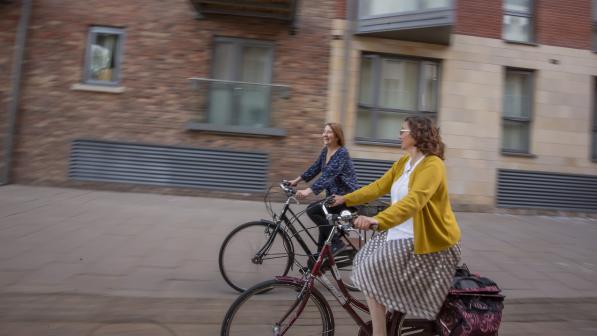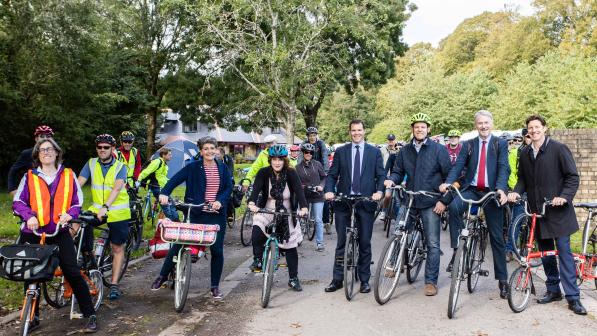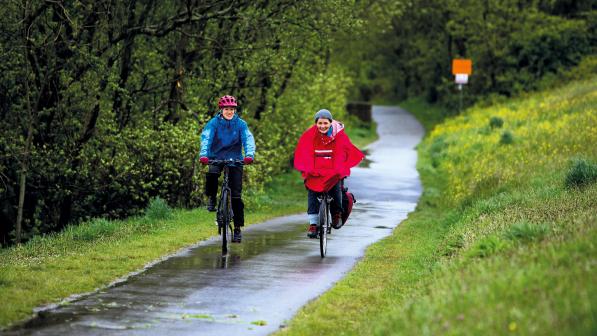Transport Delivery Plan still falls short of delivering on active travel in Wales

Back in November, I explained why Cycling UK and our volunteers in Wales found the draft Welsh National Transport Delivery Plan (NTDP) unfit for purpose.
The NTDP is meant to be delivering on Llwybr Newydd, Wales’ 20-year strategy for transport but, in Cycling UK's view, the draft didn’t do justice to MS Deputy Minister for Climate Change Lee Waters’ compelling vision of “fewer cars on our roads, and more people using public transport, walking or cycling.”
So we made forty brief but constructive recommendations which, we believe, would have greatly improved the Welsh Government’s chance of prodding transport into lowering its emissions, ultimately to Net Zero by 2050.
But hardly any of the recommendations made it through to the final version.
Were they too outlandish? We think not, but do judge for yourself – you’ll find them here – and I’ll go through some of the most troubling non-survivors below.
Is the National Transport Delivery Plan all bad?
No, not entirely.
We’re grateful, for example, that the NTDP now makes it clear that e-scooters aren’t active travel; and that the “potential to enhance active travel” gets a mention in the ‘Funding for maintenance and operation of the network’ section.
And we’re still grateful for the things for which we said we were grateful in the draft (see my earlier blog) and which are still there.
Yet the most positive change, perhaps, is something that the NTDP can’t take credit for: the Roads Review, which came out at the same time.
Strongly championed by Lee Waters MS in the Senedd as a “landmark report of international significance”, the review means that roads schemes requiring government investment from now on will all be assessed on four tests: modal shift and reduced carbon emissions; improved safety through small-scale changes; adapting to the impacts of climate change; and access and connectivity to jobs and centres of economic activity “in a way that supports modal shift”.
We will not get to net zero unless we stop doing the same thing over and over. Where we can create an easier alternative to driving, let's do so
Lee Waters MS, deputy minister for climate change
On the day both the Roads Review and the NTDP were published, Lee Waters MS said in the Senedd, "We will not get to net zero unless we stop doing the same thing over and over. Where we can create an easier alternative to driving, let's do so. It's an approach that will bring multiple benefits, and it will help those who have no alternative to the car to go about their business."
If schemes fall short, the Government won’t fund them, and dozens have already been cancelled. In theory, the financial savings from this should now be spent on the kind of schemes that do pass the above tests – all good news for walking and cycling.
The downside is that the savings may not amount to much at all (see section 7.6 of the Review report).
Another downside is this: the NTDP goes no further than describing the Review, even though, as Cycling UK’s head of campaigns Duncan Dollimore put it, it’s a “game-changer”.
A game-changer, that is, as long as the alternatives to private car use are properly delivered, which this delivery plan simply doesn’t guarantee with, amongst other things, its enduring tendency to “explore”, “consider”, “look at” (etc.) rather than “deliver”.
So, what happened to the bulk of our recommendations – recommendations that would really serve the interests of the alternatives?
Which of Cycling UK’s recommendations didn’t make it?
I won’t go through all the recommendations here, but focus on the issues I highlighted in my earlier blog.
Sustainable Transport Hierarchy definition still distorted
Shockingly, the NTDP still mostly distorts the accepted definition of the ‘Sustainable Transport Hierarchy’.
Described in Planning Policy Wales, it means prioritising walking and cycling, then public transport over private motor vehicles. It does not mean giving “priority to maintaining, managing and future proofing existing infrastructure”, as the NTDP’s ‘useful terms’ section insists on having it.
As one of our volunteers in Wales says, this means that, in theory “repainting the black line on a sign that tells motorists they can drive at 70 mph on a bypass is more sustainable than installing a zebra to allow school children to cross it.”
I can’t put it better than that.
Still no firm date for revising key documents
With so many people unsure about cycling because they’re worried about safety, we strongly advised an urgent revision to Wales’s Road Safety Framework – but it’s still only vaguely dated. The last one expired in 2020, believe it or not.
The essential update to TAN 18 (technical advice on transport issues to consider when developing planning policy and assessing planning applications) is equally vaguely dated – it’ll happen “in the next 5 years”, it seems – and it still doesn’t appear in Annex 2, which outlines the timescale for other, rather luckier projects.
The long-promised ‘Promotional Toolkit’ to help local authorities promote active travel hasn’t cleared limbo either.
Still a miserable performance on greenhouse gases
We can only assume that the final plan, in all its lack of active travel glory, isn’t likely to do better on reducing greenhouse gas emissions (GHGs) than Version One.
As we pointed out in our response to the draft, the accompanying ‘Integrated Sustainability Appraisal’ predicted that its impact on GHGs would be more or less insignificant, but we can’t find any proposed revamp to take account of the changes made to the final version.
Given the Plan’s remaining deficiencies, the appraisal would surely be much the same anyway – which says everything, doesn’t it?
Is all lost?
We hope not.
While summarising some of the positives above, I left something out: NTDP’s promise of a "new National Delivery Plan for Active Travel in Wales". After debating with myself, I decided to separate it out because it’s particularly hard to say how impactful it could be.
The good thing is that it’s a new listing in the NTDP’s Annex 2 for 2023 to 2024. The less good thing is that the Cross-Party Group on Active Travel Act in the Senedd urged the Government to produce it last year and, as it wasn’t, it’s missed out on becoming a guiding and improving force in the general delivery plan.
I wish I could say that active travel advocates in Wales have every faith that the Plan for Active Travel will now appear rapidly and pick up the NTDP’s slack, but their experience cautions otherwise.
Consequently, I didn’t merge news of this plan into my reasons to be grateful section above, tempered though it was.
What’s Cycling UK doing about it?
We’re writing an official letter to the Welsh Government, looking for answers and solid grounds for hope.
For one thing, we want to know why so many of our recommendations were picked off in the NTDP’s redrafting process. We can’t find any published feedback, despite Welsh Government guidelines on consultation explaining the need for a “summary report on the responses and outcomes” that “will help let people see that we take seriously what they tell us”.
As for hope, we’re calling again for clear, concrete, well-funded and timely action on cycling and walking and, especially, for the accepted and rightful definition of the Sustainable Transport Hierarchy to win through.
The new National Active Travel Delivery Plan has just got to live up to the Wellbeing of Future Generations (Wales) Act 2015 and Active Travel (Wales) Act 2013 – both of which set Wales apart, in a good way, from other UK nations.
But if the NTDP itself is allowed to set any kind of precedent, then strong, official government policy designed to deal with climate change, boost wellbeing and transform damaging travel habits risks never being implemented effectively in practice. This can’t be allowed to happen.
In short, we’re saying that if the Government thinks that the NTDP, something that to my mind has a cheek to call itself a ‘delivery plan’ as far as active travel is concerned, will nail its praiseworthy vision, then they’ve got a long think coming.






